- Daily & Weekly newsletters
- Buy & download The Bulletin
- Comment on our articles
New rental controls for short-term leases in Brussels
Short-term renters in Brussels will see a range of benefits from a new ordinance that came into effect on 1 November, including protection from rising rents, greater protections against negligent landlords and the right to have pets.
Among the biggest changes is that landlords in Brussels who rent out accommodations with short-term leases (less than three years) are unable to increase rent outside of legal indexation.
The ban on rent increases applies in the event of early termination or termination on expiry, and applies to all subsequent short-term contracts for a period of nine years, L’Echo reports.
The Brussels region’s intent behind the ban is to ensure that rents on short-term leases do not rise faster than those on long-term leases, which can only change as a result of indexation.
According to Federia, the Federation of Estate Agents, short-term leases account for more than 90% of the rental market in Brussels.
To monitor compliance with this ban, the landlord will have to include a number of items of information in the short-term lease, including the type of previous lease and the rent charged to the last tenant.
There was already a ban on rent increases in the event of a renunciation by the landlord, but the new ordinance also includes other provisions on a number of aspects of the lease (rental guarantee, charges, insurance, inventory of fixtures, pets, energy-saving work, reduction in withholding tax, rehousing costs and eviction without a writ of execution).
The changes give tenants greater protection, although they themselves have to meet additional obligations.
Banning pets will also no longer be possible - although the number of pets must be "reasonable" - and a landlord may not increase the base rent for nine consecutive years between two short-term leases. The last requested rent must also be mentioned in the new lease.
If the landlord wants to increase the rent, they will be obliged to immediately present the tenant with a long-term lease (nine years) in order to give tenants more security. Short-term leases (three years or less) may also not be renewed more than once, after which they automatically become long-term agreements.
The ordinance does allow an increase in rent after renovation works that improve the energy performance of the property, as long as the higher rent is proportional to the costs incurred and energy savings for the tenant.
The new rules also forbid landlords from demanding a rent guarantee of three months' rent, limiting it to just two months' rent, in which case the landlord may not include the monthly charges.
There will also be stricter rules on the repayment of the rent deposit when the tenant leaves the property, to prevent landlords from procrastinating. The deposit must be repaid within two months of departure, otherwise the landlord must pay a penalty of 10% of the rent for each month of delay.
Rent deposits also must now be deposited or transferred into a bank account, rather than as cash. The same goes for the rent itself and monthly charges, meaning landlords must open a bank account and mention it in the tenancy agreement.
Vulnerable tenants without their own bank account will be able to make a cash payment into the landlord's account through the post office or a bank branch.
Tenants will be better protected against landlords who rent out poorly maintained or unhygienic properties. For instance, if a tenant complains to the Housing Inspectorate, the landlord can no longer terminate the lease in retaliation.
And if the municipality ends up having to relocate the residents of a non-compliant property due to the poor condition of the property, it can recover the costs incurred from the landlord.
The new ordinance also imposes heavy financial penalties on the landlord in case of an illegal eviction, and entitles landlords renting to families with at least two children to new tax benefits, which they must pass on to the renters either through a separate payment or an equivalent reduction in rent.
In terms of greater obligations for tenants, renters must now take out insurance against fire and water damage before moving into the property.
The various changes are part of the housing plans of PS state secretary Nawal Ben Hamou, who wants to enshrine the right to housing in law.
The full ordinance can be found here.



















